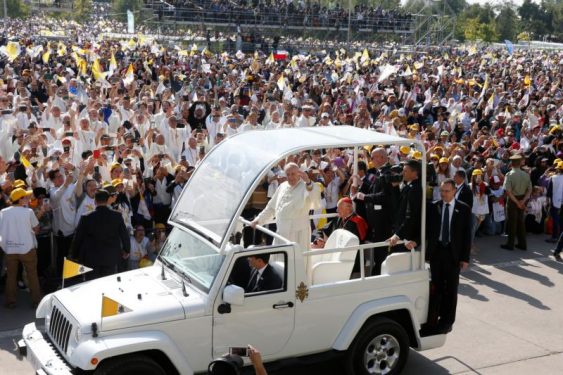
By Inés San Martín, Special to The Tablet
IQUIQUE, Chile – Pope Francis came to Chile Jan. 15-18 with some serious business on his agenda, and from the moment he touched down he’s been at it, from striving to repair the damage from clerical abuse scandals on Tuesday to delivering a plaintive plea for justice for indigenous persons and laying out a vision for Catholic universities on Wednesday.
In his last public Mass in Chile on Thursday, however, it was a more laid-back pope who came out to play, and his message could basically be summed up as follows: “Man, you guys know how to party!”
It may have contributed to the pope’s “let the good times roll” ethos that he was actually saying Mass at the beach, in a city otherwise surrounded by deserts.
The setting was the northern Chilean city of Iquique, traditionally a mining town and a center for immigrants, with large pockets of Croatians, Italians, Greeks, Scots and others, as well as Peruvians and Bolivians, and even Indians and Pakistanis brought in by British mining interests.
In that context, one way the various communities have preserved their own identities while also forging a common one has been through great religious festivals, such as the feast of the Virgin of Candelaria, the patron of miners. It dates to 1778, when tradition holds that a mule-driver saw an image of the Virgin in the mountains, leading to the construction of a popular shine.
The feast is celebrated in early February, and draws thousands of pilgrims for what locals say is always one part prayer, one part play. (Among other things, the celebrations feature a series of dances, among them are several called “the Chinese” which are linked to the Chinese immigrants who worked in the mining camps.)
Pope Francis, history’s first Latin American pope, not to mention a pastor with a great appreciation for popular religion, applauded that tradition on Thursday, while celebrating a Mass prior to his departure for Peru later in the day.
The pontiff opened his homily on Thursday by noting that Jesus performed his first miracle during a wedding in Cana – “at a party, no more or less,” the pope said.
“How much you know about this, dear brothers and sisters of northern Chile!” Pope Francis said. “How much you know about living your faith and your lives in a festive spirit!”
“I have come as a pilgrim to join you in celebrating this beautiful way of living the faith,” the pope said. “Your patronal feasts, your religious dances – which at times go on for a week – your music, your dress, all make this region a shrine of popular piety. Because the party does not remain inside the Church, you turn the whole town into a party.”
Clearly, Pope Francis meant that as a compliment: “This land, surrounded by the driest desert of the world, manages to put on party clothes,” he said, admiringly.
The pope went on to say those great feasts reflect a basic instinct of Christianity, which is that the Gospel spirit is one of joy. He offered Mary as an example of how to keep the good times rolling, noting that it was Mary who pointed out to Jesus at Cana that the guests were running out of wine, which triggered the miracle.
